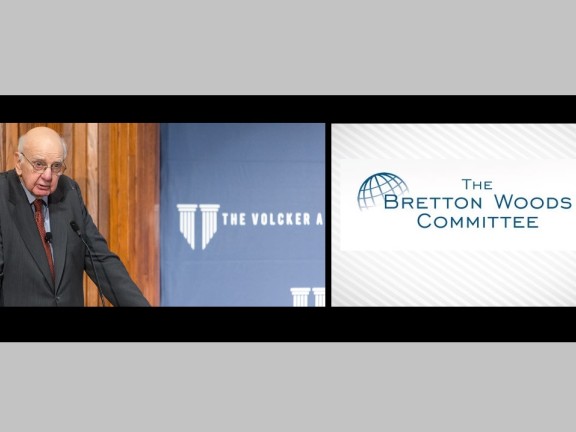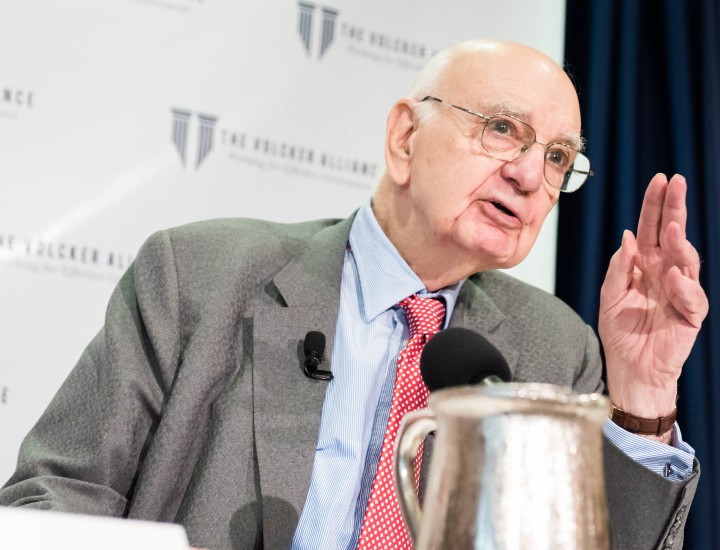Volcker Urges Global and US Policymakers to Stay Committed to Financial Reform

In wide-ranging remarks delivered today at the 2017 Bretton Woods Committee Annual Meeting held at the International Monetary Fund Headquarters in Washington DC, Paul A. Volcker encouraged policymakers globally to renew their commitment to a shared financial reform program. The meeting, which was convened to assess prospects for the global economy in a time of political and economic uncertainty, featured influential private sector leaders, policy professionals, and government and multilateral officials.
“‘Bretton Woods’ is not a particular institution,” said Mr. Volcker. “It is an ideal, a symbol, of the never-ending need for sovereign nations to work together in the common interest to support open markets in goods, in services, and in finance, all in the interest of a stable, growing, and peaceful world economy.” He observed that while substantial progress has been made on financial reform, after a few years of relative stability, “the presumed unshakeable commitment to sustaining reform appears to be waning.”
In his address today, Mr. Volcker warned that “relaxation of key reforms and the temptation to retreat inward into idiosyncratic domestic approaches needs to be resisted” since “fragmented approaches toward what are inherently international markets and financial institutions would have costs in terms of fair competition, global market efficiency, and the ability to reach a concerted approach in the event of a serious future crisis.”
With respect to US policy, he remarked that with almost seven years of experience, a review of some of the provisions of Dodd-Frank may be appropriate. But citing data on bank profits and loan growth, he noted that “claims that Dodd-Frank and other regulatory approaches have somehow gravely damaged the effective functioning of American financial markets, the commercial banking system, and prospects for economic growth simply do not comport with the mass of the evidence before us.”
In terms of specific provisions, Mr. Volcker urged policymakers to:
- Preserve Dodd-Frank’s Orderly Liquidation Authority (“OLA”), a powerful weapon in the fight against taxpayer funded bailouts of Too-Big-To-Fail financial institutions. As Volcker points out, and contrary to critics, under OLA “there is no taxpayer bailout.” Its absence, however, “might inexorably lead some future government to rescue big failing financial institutions, just as happened in 2008.”
- Maintain the Volcker Rule ban on proprietary trading and speculative hedge and equity fund investments. The concept underpinning the Volcker Rule was simple. But as Mr. Volcker noted it “became grist for the lobbying mills” and “in the process, regulators themselves, each with different priorities and financial industry relationships, haggled endlessly over the precise interpretation and enforcement of the legislative intent.” What emerged after a five-year process was a complex and lengthy rule. Nevertheless, the Rule has had a meaningful impact in curtailing risky activity and reducing conflicts of interests, and recently released data from the Federal Reserve demonstrates that market liquidity remains within historic norms.
- Reduce regulatory burdens on “true” community banks. Community banks are an engine for economic growth, and individually they are not systemic. This suggests that they should be relieved from some regulatory burdens, including Basel risk-based capital requirements, burdensome call reports, frequent full scope examinations, and stress testing, among other obligations. The challenge, however, as Mr. Volcker emphasized, “is to define just what institutions are truly community banks. It’s not only a question of size. Trading activity, and certainly speculative financial positions, are not and should not be characteristic of a true community bank.”
- Reorganize the regulatory framework. The multi-agency regulatory structure is riddled with gaping holes and overlaps. While the Financial Stability Oversight Council has been helpful in facilitating agency coordination and closing regulatory gaps, it is simply insufficient to overcome the serious flaws in the regulatory architecture. In his remarks, Mr. Volcker encouraged Congress and the new administration “to launch together a serious study of how to deal with the short-comings of a system which has outlived its rationale and usefulness.”


